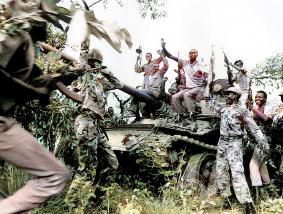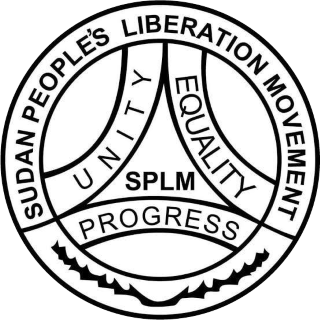Related Research Articles

The Second Sudanese Civil War was a conflict from 1983 to 2005 between the central Sudanese government and the Sudan People's Liberation Army. It was largely a continuation of the First Sudanese Civil War of 1955 to 1972. Although it originated in southern Sudan, the civil war spread to the Nuba mountains and the Blue Nile. It lasted for almost 22 years and is one of the longest civil wars on record. The war resulted in the independence of South Sudan 6 years after the war ended.

The Sudan People's Liberation Movement is a political party in South Sudan. It was initially founded as the political wing of the Sudan People's Liberation Army in 1983. On January 9, 2005 the SPLA, the SPLM and the Government of Sudan signed the Comprehensive Peace Agreement, ending the civil war. SPLM then obtained representation in the Government of Sudan, and was the main constituent of the Government of the then semi-autonomous Southern Sudan. When South Sudan became a sovereign state on 9 July 2011, SPLM became the ruling party of the new republic. SPLM branches in Sudan separated themselves from SPLM, forming the Sudan People's Liberation Movement–North. Further factionalism appeared as a result of the 2013–2014 South Sudanese Civil War, with President Salva Kiir leading the SPLM-Juba and former Vice President Riek Machar leading the Sudan People's Liberation Movement-in-Opposition.

The Lost Boys of Sudan refers to a group of over 20,000 boys of the Nuer and Dinka ethnic groups who were displaced or orphaned during the Second Sudanese Civil War (1987–2005). Two million were killed and others were severely affected by the conflict. The term was used by healthcare workers in the refugee camps and may have been derived from the children's story of Peter Pan by J. M. Barrie. The term was also extended to refer to children who fled the post-independence violence in South Sudan in 2011–2013.

God Grew Tired of Us is a 2006 American documentary film about three of the "Lost Boys of Sudan", a group of some 25,000 young men who have fled the wars in Sudan since the 1980s, and their experiences as they move to the United States. The film was written and directed by Christopher Dillon Quinn.

Bentiu, also spelled Bantiu, is a city in South Sudan and capital of the state of Unity State.
Joan Hecht is an American humanitarian and award winning author of the book The Journey of the Lost Boys. She is also the founder and President of the 501 c-3 non-profit Alliance for the Lost Boys of Sudan, an organization that assists with the health and educational needs of Lost Boys and their families living in the United States and Africa. Hecht formerly traveled as a back-up singer for The Johnny Van Zant Band and began recording professionally at age 14. However, she is best known for her work related to the Lost Boys of Sudan, including engaging in public speaking on their behalf and that of the people of South Sudan, as well as writing an award winning book about them titled, "The Journey of the Lost Boys".
John Dau, also known as Dhieu-Deng Leek is a human rights activist from South Sudan. He is one of the Lost Boys of Sudan who was featured in the 2006 award-winning documentary God Grew Tired of Us. In 2007, he founded the John Dau Foundation aiming to transform the health system in South Sudan.

Rebecca Nyandeng De Mabior is a South Sudanese politician who serves as the fourth Vice President of South Sudan. She served as the Minister of Roads and Transport for the autonomous government of Southern Sudan, and as an advisor for the President of South Sudan on gender and human rights from 2007 to 2014. She is the widow of John Garang, the late first Vice President of Sudan and the President of the Government of South Sudan, and the mother of Akuol de Mabior. She is from the Dinka tribe of Twic East County of South Sudan.
The John Dau Foundation, also known as John Dau Sudan Foundation, is a 501(c)(3) nonprofit that was established in July 2005 to develop health facilities that currently do not exist for most of the populations of Duk, Twic East and Bor South Counties in the State of Jonglei in South Sudan. Its mission is to "transform healthcare in South Sudan." Currently, the organization's primary focus is on funding and overseeing the Duk Lost Boys Clinic. The Duk Lost Boys Clinic specializes in the treatment of diseases such as guinea worm disease, malaria, chicken pox, diarrhea, malnourishment, bilharzias, h-worm, kalazar; the immunization of other diseases; and the provision of maternity services. The foundation was originally headquartered in Syracuse, New York.
Sudanese refugees are persons originating from the country of Sudan, but seeking refuge outside the borders of their native country. In recent history, Sudan has been the stage for prolonged conflicts and civil wars, as well as environmental changes, namely desertification. These forces have resulted not only in violence and famine but also the forced migration of large numbers of the Sudanese population, both inside and outside the country's borders. Given the expansive geographic territory of Sudan, and the regional and ethnic tensions and conflicts, much of the forced migration in Sudan has been internal. Yet, these populations are not immune to similar issues that typically accompany refugeedom, including economic hardship and providing themselves and their families with sustenance and basic needs. With the creation of a South Sudanese state, questions surrounding southern Sudanese IDPs may become questions of South Sudanese refugees.
Narus is a community in the Eastern Equatoria State of South Sudan. It is the headquarters of Kapoeta East County.

Human rights in South Sudan are a contentious issue, owing at least in part to the country's violent history.

The Catholic Church in South Sudan is composed of one ecclesiastical province with one archdiocese and six suffragan dioceses. There have been a total of 31 bishops in South Sudan to date. The bishops of South Sudan and Sudan are currently members of one single bishops' conference, designated as Sudan Catholic Bishops’ Conference.

Ger Duany is a South Sudanese and US-American movie actor and former refugee born in southern Sudan, who was resettled to the United States at the age of 15.

South Sudan–United States relations are the bilateral relations between the Republic of South Sudan and the United States of America.

Guor Mading Maker, also known as Guor Marial, is a South Sudanese Olympic track and field athlete. He is a Dinka tribesman.
South Sudanese Americans are an ethnic group of Americans of South Sudanese ancestry, or South Sudanese people who have American citizenship. South Sudanese Americans can include American descendants to South Sudanese ancestors or South Sudanese immigrants who obtained an American citizenship.

The Darfur genocide is the systematic killing of ethnic Darfuri people which has occurred during the War in Darfur and the ongoing War in Sudan (2023–present) in Darfur. It has become known as the first genocide of the 21st century. The genocide, which is being carried out against the Fur, Masalit and Zaghawa ethnic groups, has led the International Criminal Court (ICC) to indict several people for crimes against humanity, rape, forced transfer and torture. An estimated 200,000 people were killed between 2003 and 2005.
Cinema of Sudan refers to both the history and present of the making or screening of films in cinemas or film festivals, as well as to the persons involved in this form of audiovisual culture of the Sudan and its history from the late nineteenth century onwards. It began with cinematography during the British colonial presence in 1897 and developed along with advances in film technology during the twentieth century.
The World's Youngest Nation: South Sudan, is a 2012 South Sudanese documentary news post-war film co-directed by Matthew LeRiche and Viktor Pesenti and co-produced by Bruce Dunlop & Associates (BDA), EpicDemic Productions and Expeditionary Productions. The film documents about the emergence of a new nation from civil war, South Sudan after 60 years of civil war from Sudan on July 9, 2011. South Sudan is often named as The World's Youngest Nation, where the 70 percent of the population are under 30 years of age. The film narrates with the experiences and hopes of five Southern Sudanese youths.
References
- ↑ "Lost Boys of Sudan :: About The Film". Lostboysfilm.com. Retrieved 2016-08-04.
- ↑ "Lost Boys of Sudan :: Learn / Teach". Lostboysfilm.com. Retrieved 2016-08-04.